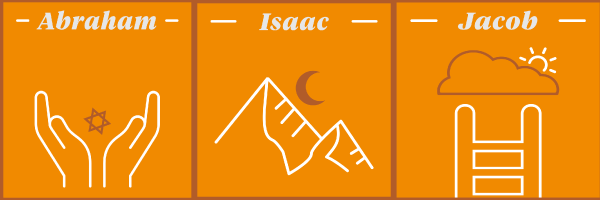This past Mother's Day, we gave a special shoutout to our foremothers: Sarah, Rebecca, Rachel and Leah. Now that it's Father's Day, we're doing the same thing for our forefathers. They may not have taught us to change a tire or ride a bike, but we have nothing but love for Abraham, Isaac and Jacob.
Abraham
Abraham is not only the father of Judaism, he's the father of all three of the world's major monotheistic religions—which is why Judaism, Christianity and Islam are all referred to as the Abrahamic religions. As a young man, Abraham answered the call from God by smashing the idols in his father's shop and departing his hometown of Ur (modern day Iraq) to found a new nation in the land of Canaan (ancient Judea and modern Israel). His covenant with God—to make his descendants a great people and to give them the land of Israel—is the origin story of the Jewish people and the reason we refer to him as Avraham Avinu: Abraham, My Father.
Isaac
Isaac's name means "he will laugh" and refers to the raucous reaction of his parents, Abraham and Sarah, when a group of angels informed them that Sarah would finally conceive an heir at age 90.
Isaac is best known for his troubled relationship with his own father, who was ordered to bind and sacrifice him at the top of Mount Moriah. God called off the operation at the last moment but it was probably a stressful experience nonetheless. However, Isaac went on to be the longest-lived of the patriarchs, reaching the ripe old age of 180.
Jacob
Isaac's son Jacob was a pious, studious man but also a bit of a mama's boy. With the help of his mother, he stole the birthright from his brother Esau and then went on the lam. During his travels, he saw a vision of an enormous ladder leading to heaven, which commentators say foretold the story of the Jewish people's exile from the Land of Israel and their return during the Messianic age.
Jacob had twelve sons with four different women. Those sons—Reuben, Simeon, Levi, Judah, Dan, Naphtali, Gad, Asher, Issachar, Zebulun, Joseph, and Benjamin—were all patriarchs of their own family groups, later known as the Twelve Tribes of Israel.



